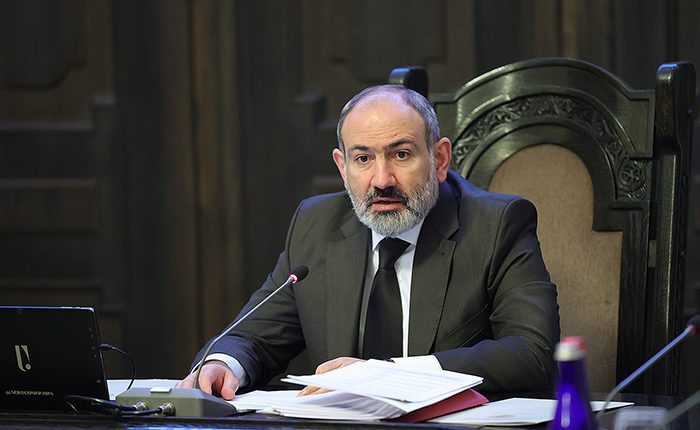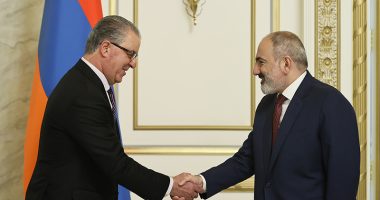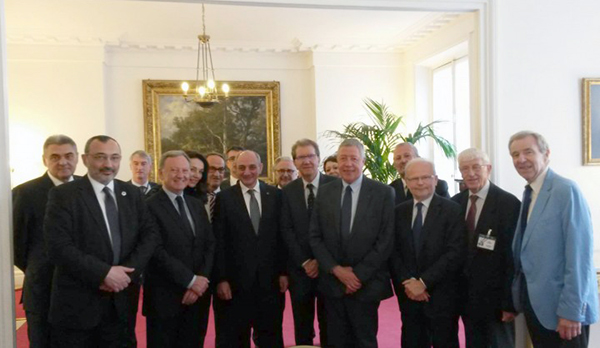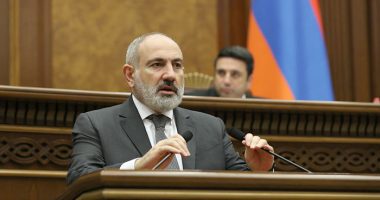YEREVAN — Armenian Prime Minister Nikol Pashinyan told a government meeting today that during a December 15 meeting with Azerbaijani President Ilham Aliyev in Brussels, the sides confirmed their earlier made decision on the construction of the Yeraskh-Julfa-Ordubad-Meghri-Horadiz railroad.
Yeraskh is a settlement on the outskirts of Ararat region of Armenia, bordering Azerbaijan’s exclave Nakhichevan, Meghri is a town in Syunik (south of Armenia, bordering with Iran and Azerbaijan). Julfa and Ordubad are in Nakhichevan, while Horadiz is in Azerbaijan proper.
Pashinyan recalled that the agreement was reached by the trilateral working group, chaired by the deputy prime ministers of Russia, Azerbaijan and Russia.
“This agreement was reconfirmed on November 26 in Sochi during a meeting (between Pashinyan and Aliyev) mediated by Russian President Vladimir Putin and at a meeting in Brussels mediated by European Council President Charles Michel,” he said.
The Prime Minister stressed that the railroad will operate in accordance with accepted international border and customs rules on the principle of reciprocity under the sovereignty and jurisdiction of the countries.
He noted that Armenia will gain access to Iran and Russia through this railroad, and Azerbaijan will have a railway connection to Nakhichevan.
“I want to draw attention to the following aspect: if we manage to start a certain effective dialogue with Turkey and if it opens its border with Armenia, this project may get a much larger scale. That is, the railroad we are talking about will stretch further from Yeraskh to Gyumri and from Gyumri to Turkish Kars,” he said.
According to Pashinyan, ‘we need to start building the railroad after completing some preliminary work, including the design, tenders and other things.’
“Part of this work has already been done, but now we must get down to practical implementation of the project. We will have a smaller consultation in the near future to flesh out our vision, schedule and roadmap. Our wish and intention is to have the railroad built as soon as possible,” he said.
Pashinyan noted that the agreement is important because it will essentially change the economic, investment and political atmosphere of security in the region. He stressed that in the near future the authorities must also concentrate on solving this problem.
“An agreement was also reached with the president of Azerbaijan that contacts will continue with an attempt to form and formulate common views and approaches around our agenda: that is, to coordinate and overcome the differences that exist,” he said.











2 comments
Quote: “This agreement was reconfirmed on November 26 in Sochi during a meeting (between Pashinyan and Aliyev) mediated by Russian President Vladimir Putin and at a meeting in Brussels mediated by European Council President Charles Michel,” he said.
Always nice when soveign pieces of the puzzle fall together and also the north-south (Iran-Russia) will be established with this agreement.
After I reported earlier that Iran has woken up and actually anticipated too late the strategic intentions of Turkey and Azerbaijan, you can see a very fast shift taking place, which will be to the disadvantage of Turkey and Azerbaijan.
Iran recently made it clear to Azerbaijan that the Rubicon should not be crossed. Iranian national interests exceed religious equality between the two countries.
According to sources, it is known that Baku and Ankara have been conducting a hidden destabilization policy in Northwest Iran since many years. Iran and Turkey are literally each other’s archenemies.
Back to the failed war plans of Ankara and Baku in November 2020, a land corridor across Armenian territory (Artsakh was a distraction, sideshow and tasty snack). The oil/gas pipeline connection and the entire closure of Armenia with Iran was the main objective. Russia has prevented this in view of Moscow’s interests.
Iran sees this clearly too finally. Iran and Azerbaijan are at loggerheads nowadays.
The containment policy on Turkey has borne fruit. The latest Turkish skirmishes with the US and Russia speak volumes. Erdogan’s visits have not led to the Turkish desired result in either capital. No photo sessions that he can come home with. That hurts in Ankara.
A little further on in Baku, you can see the same thing happening at the moment, at lightning speed. Iran is tightening economic and political ties with Armenia. A clear signal during mutual visits in Yerevan and Teheran. Common and national interests (trade and water supply Aras river).
Also Russia is visited by Iran and here also the situation will be discussed behind closed doors. Both countries have more common interests than are usually revealed. Both countries also have a common opponent, namely Turkey and a common denominator in Syria and Armenia. And coincidentally, this is now Turkey’s hybrid two-front war against Russia and Iran.
All this simply means, that the intended goal of Ankara and Baku, the closing off and dividing of Armenia (land locked country and land corridor) and thus also closing off and destabilising Iran, will work against them.
The reverse will happen, Azerbaijan will be closed off by Moscow and Tehran through containment themselves.
Turkey has already run into closed doors in Washington and Moscow and cannot do much more, given the clear message from both capitals.
According to sources, Ankara and Baku are falling into their own sword.
Who does not know the saying? Whoever lifts the sword, is felled by the sword.
Interesting analysis, Robert. But why do you think Russia is making overtures to Turkey, continuing to sell them weapons but not selling weapons to Armenia? And why has Russia not honored her OSCE treaty commitments to defend sovereign Armenia against attack… the ongoing incursion (invasion?) of sovereign Armenia (not Artsakh) by Azerbaijan?
Azeri forces completely control sovereign Armenian land in Syunik and Goris. How is this explained by your post?